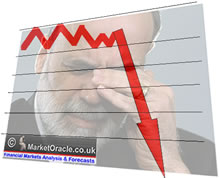Financial Crisis in Russia Ruins Economies of Post Soviet States
Economics / Russia Sep 25, 2009 - 06:53 AM GMTBy: Pravda
Migrant workers who earn their living in the Russian Federation sharply reduced the size of bank transfers to their families. According to the report of Asia Development Bank, in the first six months of 2009, the sum of money transferred by migrants to the countries of the Caucasus and Central Asia reduced by approximately 25 percent compared to the same period last year. However, the money transferred by guest workers is a serious support factor for the economies of post-Soviet countries.
 According to the World Bank, in 2008 migrants officially transferred $318 billion to their countries. For many developing countries these funds are one of the main sources of foreign currency. These funds support internal demand to the detriment of the demand of the country of stay, and therefore, foreign producers oriented at their own market. Besides, for many countries, transfers from Russia are the strongest tool for fighting poverty and therefore, an element of ensuring political stability.
According to the World Bank, in 2008 migrants officially transferred $318 billion to their countries. For many developing countries these funds are one of the main sources of foreign currency. These funds support internal demand to the detriment of the demand of the country of stay, and therefore, foreign producers oriented at their own market. Besides, for many countries, transfers from Russia are the strongest tool for fighting poverty and therefore, an element of ensuring political stability.
According to the analysis conducted by Adams and Page back in 2003, 10 percent increase in the proportion of migrants in a country population causes 1.9 percent reduction in the population whose daily income does not exceed $1.
There are countries that are largely dependent on the guest workers inflows. According to the World Bank, migrants’ bank transfers account for 36 percent of the GDP of Moldova and Tajikistan, and 27 percent of Kazakhstan’s GDP. However, adequate statistical analysis is complicated by the so called “gray transactions,” made through relatives, friends, and neighbors. Growing jobless rate in Russia causes chain reaction in the recipient countries.
“Deep recession in Russia decreased trade, investment, and money transfers to the subregion countries, which often has a significant depressing effect,” the document states. In particular, the sum of money sent by migrants from Russia to the countries of that region fell by approximately 25 percent in the first half of 2009. “Since these transfers are the main source of income for some countries, it affected internal consumption in a negative way and interferes with payment balances,” Prime Tass quotes the experts’ conclusion.
According to Asia Development Bank (ADB), Armenia, Georgia, and Kazakhstan were affected by the crisis the most. Uzbekistan and Turkmenistan, on the other hand, turned out to be more stable since they have sufficient natural resources and closed economies.
ADB believes that Kazakhstan’s GDP will fall by 1 percent in 2009. In Kyrgyzstan, where according to the latest data, the amount of bank transfers decreased by 24 percent during the first six months, experts still predict a doubtful growth by one percent instead of four percent predicted earlier. However, Kirgizia and the funds it received from Russia and other countries is another story.
The prediction for Tajikistan’s GDP was lowered from 3 to 0.5 percent, and for Turkmenistan – from 10 to 8 percent, which does not look bad in the crises. Despite high oil prices, the forecast for Azerbaijan’s GDP was lowered to 3 percent from initial 8.
“Despite the recession, Russia continues to provide significant aid to many countries of the region,” the report says. The aid comes in the form of large loans provided to Kyrgyzstan and Armenia.
Vitaly Salnik
Bigness.Ru
Disclaimer: The above is a matter of opinion provided for general information purposes only and is not intended as investment advice. Information and analysis above are derived from sources and utilising methods believed to be reliable, but we cannot accept responsibility for any losses you may incur as a result of this analysis. Individuals should consult with their personal financial advisors.
Pravda Archive |
© 2005-2022 http://www.MarketOracle.co.uk - The Market Oracle is a FREE Daily Financial Markets Analysis & Forecasting online publication.



